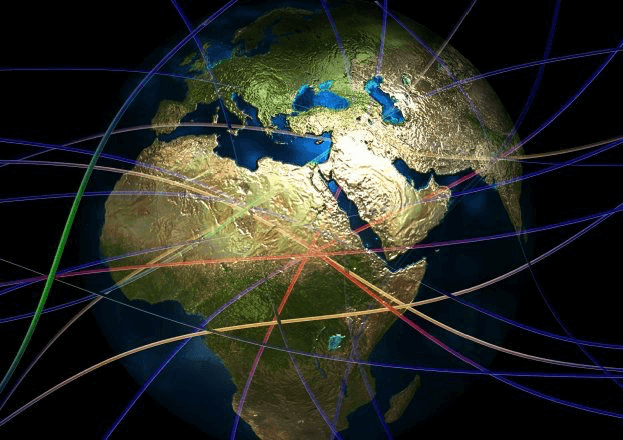Another very popular topic in IELTS is globalization. You are very likely to have it in Writing task 2. So let’s polish our vocabulary on this topic!
The first important words are developing countries and developed countries

- Developing countries are countries with little industrial and economic activity where people generally have low incomes.
- Contrarily, Developed countries are countries with a lot of industrial and economic activity where people generally have high incomes.
There is also another good term – emerging economy or emerging market economy which means a nation’s economy progressing toward becoming developed and advanced.
Example : Though it once reigned alongside the United States as a world superpower, Russia is not classified as a developed country as of 2015.

Now let’s talk about the term «global» and some combinations with it. Global village / global economy / global trade
- Global village – the idea that we became a single community due to affordable and effective transportation, mass media, and electronic communications.
Example : People are afraid that the evolution of a global village will raise conflicts between cultures. - Global economy refers to economy of the world comprising economies of different countries closely interrelated. By the way, interrelated is another very good word to use when speaking about global economy and globalization.
Example : Thanks to global economy a shirt is now likely to cost roughly the same amount of money in New York as in New Delhi. - And finally, global trade (often international trade) is simply the exchange of goods and services between countries.
Example : Global trade not only results in increased efficiency, but also allows countries to participate in global economy, encouraging the opportunity of foreign investments.
Let’s continue our studies and examine two new words connected with globalization.

Sweatshop and outsourcing.
- Sweatshop (sometimes sweat factory) is a workplace with unacceptably severe conditions and usually extremely low wages.
Example : In 2006 Apple faced allegations that its iPod was being produced in China’s sweatshop conditions. The Apple incident illustrates how sweatshops can thrive with such practices as outsourcing. - Outsourcing means just what it says – going out to find the source of what you need. In the globalization context we usually use the term outsourcing to describe a situation when businesses outsource production to countries with developing economies.
Example : Offshore outsourcing is often criticized, which can mean bad public relations for a company.

Our next phrase is loss of identity.
And this is what can happen if the idea of global village develops further.
Example : Some people fear that globalization will inevitably lead to total loss of cultural identity.
Our next group of words is prosperity, standard of living, and Human Development Index.
- Prosperity. To put it simply it is the state of being successful usually by making a lot of money.
Example : Globalization plays an important role in contributing to sustainable prosperity for all people. - Standard of living could be described as a quality of life or level of material prosperity available to an individual or a group of people.
Example : The standard of living includes factors such as: income, availability of employment, affordability of housing, quality of healthcare, and many others.
And finally, Human Development Index (HDI) is an index prepared by the United Nations which lists countries in the order of human achievement taking into consideration three dimensions: health, education and living standards.
Example :Human Development Index also shows that countries with lots of income do not always spend money in ways that create high life expectancies or education levels.
All these new words are very important when you want to talk or write about globalization.

Let’s move on. Our next term is consumerism.
It is the belief that it is good for people and society to spend a lot of money on goods and services.
Example : Although consumerism can take many forms, it generally refers to very high levels of excessive consumption.
Now we move on to another pair of words which students often confuse.
Emigration / Immigration
The differences between these words are subtle but important for precise writing and speaking.
- To immigrate means to settle in a foreign country. It suggests permanent relocation and applies to people.
- To emigrate means to leave one country in order to settle in another. It also applies only to people.
Example :
- It’s noteworthy that during the boom years when Ireland had close to full employment not many people chose to emigrate.
- Every member of the Jewish religion is eligible to immigrate to Israel.

And two more terms are cultural convergence which is a tendency for cultures to blend and become more alike and cultural divergence which describes things that make separations of cultures.
The English language is a prime example of cultural convergence on a global scale.
That’s all for the word pairs. And here we have a couple of international agencies which directly influence globalization development.
- World Trade Organization (WTO) – global organization that helps countries and producers trade fairly and effectively.
- International Monetary Fund (IMF) Intergovernmental organization with its headquarters in Washington, D.C. that focuses on maintaining international economic stability.
Here’s a list of some other very useful words and phrases for preparation for IELTS Globalization topics.
Additional vocabulary
- antiglobalization movement – s a social movement critical of the globalization of corporate capitalism. (Wikipedia)
- local (relating to a particular area, city or town) / national (relating to an entire nation or country) / domestic (relating to, or made in your own country)
- integration (the act of bringing together smaller components into a single system that functions as one) / cooperation (a situation in which people work together to do something)
- multilateral (involving more than two groups or countries) / unilateral (involving only one group or country)
- progress (the process of improving or developing something over a period of time) / development ( the act or process of growing or causing something to grow or become larger or more advanced)
- protest (an event at which people gather together to show strong disapproval about something) / strike (a period of time when workers stop work in order to force an employer to agree to their demands) / demonstration ( an event in which people gather together in order to show that they support or oppose something or someone)
- standardization – is the process of implementing and developing technical standards. (Wikipedia)
- national sovereignty – the idea that independent nations, which have declared their independence, have an organized government and are self-contained, have a right to exist without other nations interfering (ask.com);
- to accelerate – cause (something) to happen sooner or more quickly;
- affluence – abundance of property;
- to dominate – to have control of or power over (someone or something);
- economic growth drivers – something that provides development and growth of economy;
- imbalance / inequality – a state or condition in which different things do not occur in equal or proper amounts;
- superpower – an extremely powerful nation;
- tariff – a tax on goods coming into or leaving a country;
- trade barrier – a government-induced restriction on international trade;
- borders – boundaries between countries;
- fair trade – trade in conformity with a fair-trade agreement;
- interdependence – the mutual reliance between two or more groups;

